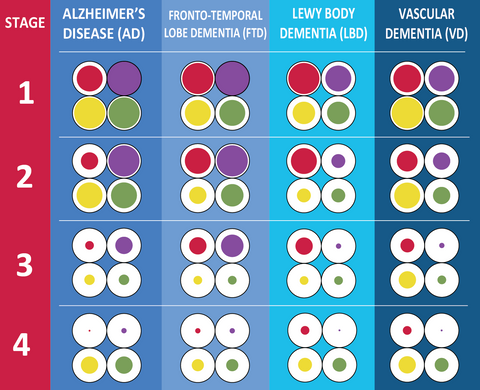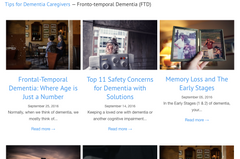Being a progressive disease, Alzheimer’s gradually, over time, destroys the brain’s capacity to functional normally. As more parts of the brain are damaged, more severe symptoms develop. In the initial stages, the disease begins to affect a person’s daily life and functioning and eventually progresses to a stage where the person becomes completely dependent on others for basic care and daily living.
It is important to remember that while there are general symptoms for Alzheimer’s, no two individuals experience the conditions in the same way and there is no one timeline. However, the progress of Alzheimer’s can be roughly categorized into four stages: Cognitive Impairment, Early Stages, Middle Stages and Late Stages.
Stage 1: Cognitive Impairment
One of the first parts of the brain that is affected is the hippocampus, which is the center for emotions and memories. This is why for most people, the very first signs of Alzheimer’s are memory loss, especially difficulty remembering new information and recalling recent events as well as mood changes. Usually at this point of the disease, patients may simply attribute these symptoms to the natural progression of old age. However, observers such as friends and family may be able to detect the changes more effectively.
Stage 2: Early Stages
Although the disease is still at an early stage at this point, individuals with Alzheimer’s tend to suffer from an increased frequency in memory lapses. For example, they may:
- Misplace items—unable to find keys, glasses, and other items around the house
- Unable to recall recent conversations or events—forgetting appointments and dates
- Have trouble recalling words, names, places, or objects
- Repeat themselves regularly, such as repeating a task or question
- Find it more difficult to make decisions
- Become more hesitant and less willing to try new things
The mood changes also can become heightened, where the person may often be agitated, confused, or depressed. They may become withdrawn and lose interest in activities and hobbies that they used to find exciting.
Stage 3: Middle Stages
By this stage of Alzheimer’s, people begin to lose the ability to care for themselves and would need support to accomplish daily tasks such as eating, dressing, washing, and even using the toilet. This is mainly caused by their worsening memory problems. Some of the obvious symptoms at this stage are:
- Not being able to remember names of people they know, including family and friends
- Getting lost or wandering or losing track of time due to increased confusion and disorientation
- Repetitive behavior—forgetting that they’ve eaten a short while ago and start to eat again
- Hallucinations and becoming suspicious of family members or having delusions about them
- Speech and language difficulties
- Frequent changes in mood—may go from being excited to depressed in a short time
- Reduced spatial recognition
Stage 4: Late Stages
During the final stages of the disease, the symptoms become severe and causes much distress for both the person with the condition as well as their caretakers, family, and friends. In some cases, they may become extremely violent and suspicious of those around them. Hallucinations and delusions also tend to be severe at this point. Other extreme symptoms in this stage include:
- Inability of difficulty eating and swallowing
- Inability to change position or move around without assistance
- Either considerable weight loss or weight gain - some people eat too much because they forget that they've had their meals while others eat too little because they think they've already eaten
- Loss of control over urinary and bowel movements
- Gradual loss of speech
- Severe memory problems—both short term and long term memory
At this stage, most people would require full time caretakers to assist them with their daily activities such as eating, moving, and using the toilet.
It is important to note that the rate of progression of Alzheimer’s in each person is different. No two people’s symptoms develop the same way or within the same time frame. Therefore it is difficult to predict exactly how quickly or slowly a person may deteriorate. In general, people diagnosed with Alzheimer’s live an average of eight years after their symptoms become noticeable. However, depending on the rate of progress, survival can range from as little as four years to a couple of decades. This also depends on the age of onset and other health factors.
This infographic summarizes symptoms experienced at each stage of Alzheimer's Disease. Symptoms in bold are more common in Alzheimer's than in other types of dementia:





